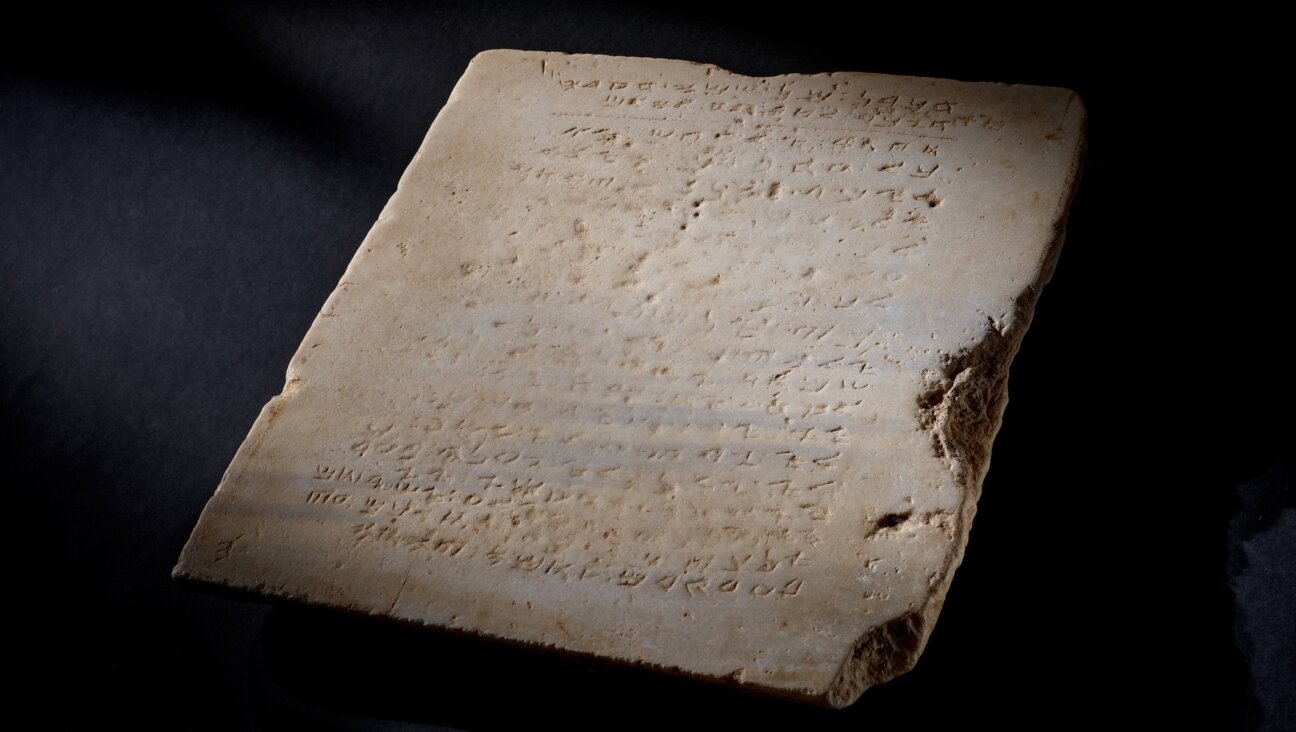A Star in His Own Right

Stanley Fischer
Stanley Fischer, a Litvak From Rhodesia (Now Zambia) Who Transformed Israel’s Economy, Honored at Yivo Institute for Jewish Research Benefit, at N.Y. Public Library
“I was born in Lusaka, Northern Rhodesia [now Zambia]… a true Litvak,” began Stanley Fischer, governor of the Bank of Israel and honoree at the YIVO Institute for Jewish Research’s December 1 benefit, held at the New York Public Library. Preceding the acceptance speech of YIVO Lifetime Achievement Award recipient Fischer was the lighting of the first Hanukkah candle; the singing of “Ma’oz Tzur” (“Rock of Ages”) by the 300-plus dinner guests; welcome remarks by YIVO chairman of the board, Bruce Slovin, and greetings by The New Republic’s editor in chief, Martin Peretz. Salutations were given by dinner chair William Ackman, founder and managing member of Pershing Square Capital Management LP, who said, “Israel is fortunate to have Fischer.” Averring, “ I am not an economist, I am not a Jew, I am not a Litvak,” British historian Niall Ferguson, author of “The Ascent of Money: A Financial History of the World “(Penguin Press, 2008), said, “Fischer is one of the stars of the world’s economies,” and joshed, in an aside, “Is [Ben] Bernanke your sorcerer’s apprentice?” alluding to the chairman of the United States Federal Reserve, who, like U.S. Secretary of the Treasury Tim Geithner, and [another of the evening’s greeters] Lawrence Summers, director of the White House National Economic Council, had been Fischer’s student at Massachusetts Institute of Technology.

Stanley Fischer
“My father, Philip, was born in Latvia, and in 1926, at 19, came to Rhodesia,” Fischer said. “Why Rhodesia? Because… Cecil Rhodes wanted Jews in the country. He invited them because they were constructive. My mother, whose parents were from Lithuania, was born in Cape Town. She found her husband on her own — no matchmaker. She read true love comics! Therefore I am a true Litvak. At 10 I was sent to Cape Town to a boarding school to study for my bar mitzvah…. My wife, Rhoda, and I were members of [the Zionist Youth Group] Habonim.”
Fischer, who from 1994 to 2001 served as first deputy managing director of the International Monetary Fund and from January 1988 to August 1990 was vice president of development economics and chief economist at the World Bank, informed. “I was economic advisor to George Schultz,” He added, “I always wanted to contribute something to Israel.” Fischer said he was elated when Benjamin Netanyahu called. With a smile, Fischer stated: “I enjoy life in Israel. It is warm, pleasant, exciting.” Alluding to “the Jews’ [biblical] patriarchs,” he joshed: “They’d never make it facing today’s media. Great heroes like David had too many flaws…. People running Israel today have flaws.”
Seeking some way to make a Litvak connection, Ferguson, whose latest book is “High Financier: The Lives and Times of Siegmund Warburg” (Penguin Press), defined himself as “a Scotsman — a kind of Litvak — a Jew with alcohol and violence problems.” He said, “We [Scots] are a minority whom no one dared to persecute.” Highlighting Fischer’s accomplishments, he proclaimed that “since Fischer came to Israel, inflation is 6%; in Jordan it is 20%.” He touted the “bullish optimism of Israel’s economy — 7,000 patents [this year], compared to 367 for all Arab countries combined; Israel’s innovations in 2008 [included] 10,000 patents; Iran [had] 50 for the same time. What is important is innovation…. Innovation drives growth.”
The next day, I called dinner co-chair and YIVO board member Leo Melamed, who was unable to attend the benefit. The chairman emeritus of the Chicago Mercantile Exchange (a childhood friend and, like me, a survivor and Sugihara visa recipient), who has written several books and knows Fischer, told me: “Stanley Fischer was the perfect choice as the central banker for Israel during a most difficult juncture in history. He brought a wealth of experience, a solid financial philosophy and unequaled international credibility. Early on, he persuaded Bibi [Benjamin] Netanyahu to request that we list the Israeli shekel for trade on the CME futures exchange. It was meant as a strong signal to the world that Israel was prepared to be a global participant in international trade and was representative of Fischer’s economic vision for the nation of Israel.”
Dan Doctoroff an Honoree at Museum of Art and Design Gala
When Robert Moses’s Museum of Arts and Design chairman emeritus Barbara Tober introduced Daniel Doctoroff, recipient of the Corporate Visionary Award, at MAD’s November 30 Visionary Gala at the Mandarin Oriental, she quoted New York City Mayor Michael Bloomberg **saying that Doctoroff “did more to change this city than Robert Moses.” Tober, who had been last year’s gala honoree, also said Doctoroff “understood that culture, art and finance belong together. Without Dan, MAD would not exist.” Now president of Bloomberg LP, Doctoroff alluded to the serpentine route that “helped turn an eyesore into a jewel.” Leapfrogging over such obstacles as “seven lawsuits with the Landmarks [Preservation Commission],” plus outwitting a not-too-happy **Donald Trump (whose expletives he would not articulate), Doctoroff boasted that what had been “a decrepit old structure… is now a thriving public space…. We have the highest tourist visits…. What MAD does with its exhibits… sometimes bizarre… helps ensure that New York City does indeed reinvent itself.”
MAD director Holly Hotchner, who hosted the event, presented the organization’s Lifetime Achievement Visionary Award to Seth Glickenhaus, chief investment officer of the company that bears his name. Referred to as “the legend of Wall Street” and as Wall Street’s “oldest investor,” 96-year-old Glickenhaus founded the company in 1938 with $500. In honor of Glickenhaus, a founding trustee of the museum, MAD has named its museum classrooms, where 10,000 children and students annually received instruction in art, the Sarah and Seth Glickenhaus Education Center.
George Beylerian recipient of MAD’s Design Visionary Award, was introduced as a legendary trailblazer in the field of contemporary design. The Artist Visionary Award was presented to Janet Nkubana and Joy Ndungutse, artists and social entrepreneurs who founded the Rwandan basket-weaving collaborative Gahaya Links.
Lupus Foundation Honors Its Founders, Susan Golick and Her 100-Year-Old Father, Morrie Golick, at Its ‘Life Without Lupus’ 40th Anniversary Gala, at Avery Fisher Hall
With S.L.E. Lupus Foundation founders Susan Golick and her father, Morrie Golick, being serenaded by opera diva Jessye Norman from the stage at Lincoln Center’s Avery Fisher Hall, the November 22 Life Without Lupus Gala benefit was off and running. Hosted by MSNBC’s “Morning Joe” hosts Joe Scarborough and Mika Brzezinski, with Tony Award winners Jane Krakowski and Cheyenne Jackson as musical headliners, the event included congratulations via video by New York City Mayor Michael Bloomberg; a surprise appearance by New York State Senator Charles Schumer, who vowed to make sure “Washington paid attention to lupus,” and Norman leading the black-tie guests in singing “Happy [100th] Birthday, Morrie” as a huge cake was rolled onstage. In honor of the S.L.E. Lupus Foundation, the Empire State Building was lit up in orange, the foundation’s official color.
Among more than 600 guests were New Jersey Senator Frank Lautenberg and his wife, Bonnie Englebardt Lautenberg; Queens District Attorney Richard Brown; New York City Deputy Mayor Patricia Harris; New York State Assemblywoman Vanessa Gibson, and, seated next to me in the theater, Martin Segal, chairman emeritus of Lincoln Center for the Performing Arts (and a cousin of artist Marc Chagall). In front of me sat former Bronx boro president Fernando Ferrer, who lost the 2005 mayoral election to Bloomberg. As we walked toward the dinner tables, Ferrer and I reminisced about the “shetl” that had been the South Bronx, where my husband, Joe, grew up. It was familiar territory for Ferrer, who remembered the pickle man and the chicken flickers of yore.
A special father and daughter trumpeted as “the power of one,” the Golicks started the foundation 40 years ago in their garage in Great Neck. N.Y. They funded the young researchers, who went on to create the nation’s best lupus labs. Ten years ago, the Golicks launched the Lupus Research Institute — now the nation’s leading private supporter of innovative research in lupus — which to date has raised $100 million. The evening’s corporate honorees were Human Genome Sciences and the pharmaceutical firm GlaxoSmithKline, the latter of which developed Benlysta, the first drug specifically designed for lupus patients. Lupus, a chronic and potentially fatal autoimmune disorder that is a leading cause of cardiovascular disease and strokes, currently affects nearly 2 million (mostly young) women, in the age range of 14 to 44. The evening’s subtext was, “Life without lupus will be a reality.”
Hanukkah a la Francaise — Candle Lighting at French Consulate in New York
“We share a common history, French and Jews, Jews and Americans,” said Philippe Lalliot, consul general of France ,at the December 2 Hanukkah reception he hosted at the consulate. The buffet tables showcased lox, cheese and fruit. “It is a history that includes great suffering for the Jewish people. It is also the unfolding of a 1,000-year struggle for human rights, equality, resistance against oppression…. For me,” said the yarmulke-wearing consul, “Hanukkah offers both a festive and a solemn opportunity to express France’s bonds of friendship with you.” Lalliot acknowledged French-speaking Rabbi Levy Djian (of Paris and now Brooklyn’s Crown Heights) who suggested I go to his Torah on Demand website); Rabbi Mikhael Cohen of the Centre Culturel Juif Francophone de New York, and international affairs specialist Harriet Mandel , who helped organize the program that showcased the SAR Choir.
“I would also like to emphasize the close attention France pays to the quality of its relationship with Israel, in particular in the difficult environment we are all familiar with,” Lalliot continued. “We continuously stress that the Israeli people must be able to live in security within recognized and guaranteed borders. President [Nicolas] Sarkozy steadfastly proclaims his friendship for Israel and says that Israel’s security is nonnegotiable.”
In a didactic tone akin to a that of a rabbi or Hebrew schoolteacher, Lalliot spoke eloquently of Hanukkah, “which we Jews and non-Jews are celebrating together this evening,” alluding to the Gobelin tapestry, “The Triumph of Mordecai,” which dominates the room’s wall. “Hanukkah is an opportunity to celebrate a victory over those who want to exterminate a people, whether by arms or by forced assimilation.” He quoted Rashi and explained that the initials nun, gimel, hey, shin, “which stand for ‘a great miracle happened here,’” actually were used “to conceal the fact that the Jews were studying the Torah, a banned activity.” It was the first time I heard “Ma’oz Tzur” performed by a chamber group. Lalliot concluded: “I sincerely hope that the dialogue between the consulate and the Jewish community will continue to flourish…. You can count on me and my staff to do everything we can to nurture this friendship.”
A message from our CEO & publisher Rachel Fishman Feddersen

I hope you appreciated this article. Before you go, I’d like to ask you to please support the Forward’s award-winning, nonprofit journalism during this critical time.
We’ve set a goal to raise $260,000 by December 31. That’s an ambitious goal, but one that will give us the resources we need to invest in the high quality news, opinion, analysis and cultural coverage that isn’t available anywhere else.
If you feel inspired to make an impact, now is the time to give something back. Join us as a member at your most generous level.
— Rachel Fishman Feddersen, Publisher and CEO





















